- Home
- Media Kit
- Current Issue
- Past Issues
- Ad Specs-Submission
- Ad Print Settings
- Reprints (PDF)
- Photo Specifications (PDF)
- Contact Us

![]()
ONLINE


Miles and Kelly Nadal visit Yad Vashem, Israel’s official memorial to the victims of the Holocaust. Positioned on the western slope of Mount Herzl, the memorial consists of a complex containing the Holocaust History Museum, memorial sites such as the Children’s Memorial and the Hall of Remembrance, the Museum of Holocaust Art, sculptures, outdoor commemorative sites such as the Valley of the Communities, a synagogue, a research institute with archives, a library, a publishing house, and an educational centre, the International School/Institute for Holocaust Studies. Miles generously donated to Yad Vashem to commemorate the victims, honour the perseverance of the survivors, and to never forget the vulnerability of others. The generous contribution of the family is etched on the Miles S. Nadal and Family Wall.
Integrity, Respect and Accountability
Editors’ Note
Miles Spencer Nadal (milesnadal.com) is an international entrepreneur and philanthropist. He passionately believes in championing people to pursue their dreams without limit, having founded the Dare to Dream initiative to support ambitious entrepreneurs and those in need. The principal motivating factor behind Nadal’s business success is his desire to make a difference in the world by giving back. After starting a photography business while in junior high school, he eventually grew it into Action Photographics which included a team of professional photographers, as well as a commercial photography business. That was ultimately transformed into Multi-Disciplinary Communications and then MDC Partners Inc., which became one of the largest marketing and communications companies in the world. Nadal has been nominated for Canada’s Top 40 Under 40, and was the recipient of Ernst & Young’s Entrepreneur of the Year Award™. Among his awards are the Harold Lederman Award for Philanthropic Leadership, Jewish National Fund Negev Honoree, Toronto Chapter of the American Marketing Association Marketing Hall of Legends, Executive of the Year by MEDIA Magazine, and Damon Runyon Cancer Research Foundation honoree. Nadal was awarded an Honorary Doctorate of Philosophy degree from Tel Aviv University, and was recognized for contributions to Harlem RBI, an initiative for youth playing, growing, and learning. He is a member of the Board of Governors of Tel Aviv University where he endowed a home for technological innovation and entrepreneurship, as well as serving on the International Board of Governance of The Peres Institute.
Firm Brief
Peerage Capital (peeragecapital.com) is a leading North American business services and private investment firm. It is focused on partnering with exceptional management teams to form long-term investments across several strategic business services platforms including real estate services, real estate ownership, self-storage, land assembly, asset management and wealth advisory services. Its growing network of partner companies currently employs 2,000 people across Canada and the United States approaching $6 billion in total assets under management.
Will you discuss Peerage Capital’s corporate culture and its focus and commitment to “giving back”?
One of the greatest lessons I’ve learned as an entrepreneur is the critical importance of purpose beyond balance sheets or deals. Connecting with the community around you and building a corporate culture that reflects that priority has been the single greatest source of personal satisfaction to me.
I’ve been fortunate enough to fund a community center that serves Toronto’s very diverse population, a heart center that does groundbreaking work on neo-natal and post-natal cardiac care for mothers and infants, and a Boys and Girls Club that provides hundreds of youngsters from a low-income area with a range of after-school programs.
Equally dear to my heart are the grassroots causes that Peerage employees support in our own backyard, from Meals on Wheels to a local Food Bank. I can’t be everywhere we give, but our employees are directly involved at the board level, collaborating with in-house communications teams to build profile and stocking shelves every Friday at the Food Bank. They also deliver over 30 hot meals a week to people in need.
“A hundred years from now it will not matter what my bank account was, the sort of house I lived in, or the kind of car I drove, but the world may be different because I was important in the life of a child.”
- Forest E. Witcraft
(Miles Nadal’s favorite quote)
How does Peerage Capital’s business mandate extend to its philanthropic work?
Our business and philanthropic mandates converge around core values. The values that are central to the way we do business with all our partners are clear: integrity, respect, and accountability. Those extend seamlessly to our commitment to contribute to the community. After all, the community supports us every bit as much as we support the community.
To be clear, our definition of community is a very broad one. Yes, we focus a great deal on Toronto, where we have a head office, but I am also active in Israel and the U.S.
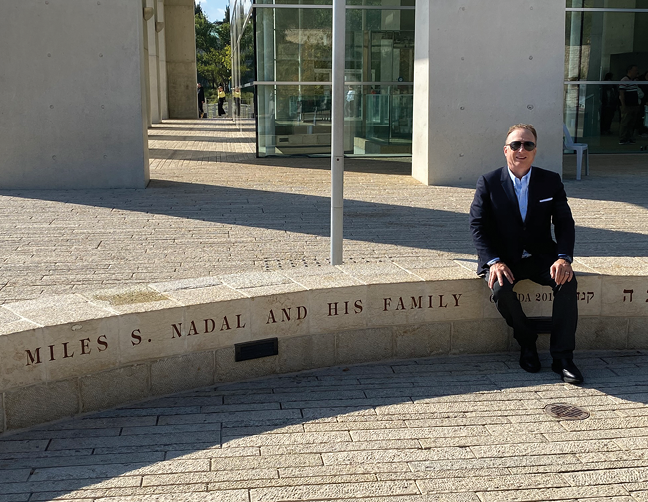
Miles Nadal in front of the Miles S. Nadal and Family Wall
at Yad Vashem, Israel’s official memorial to the victims
of the Holocaust.
Peerage Capital has a broad range of long-term philanthropic initiatives. Will you highlight these initiatives and the key areas of focus for the company’s philanthropic efforts?
We get a lot of requests for funding from a great many causes, and we do judge each one on its own merits. There are also special situations where we’ve responded with donations in a time of crisis or need.
That said, if everything is a priority, nothing is a priority. That’s why we focus on healthcare, child welfare, education and community.
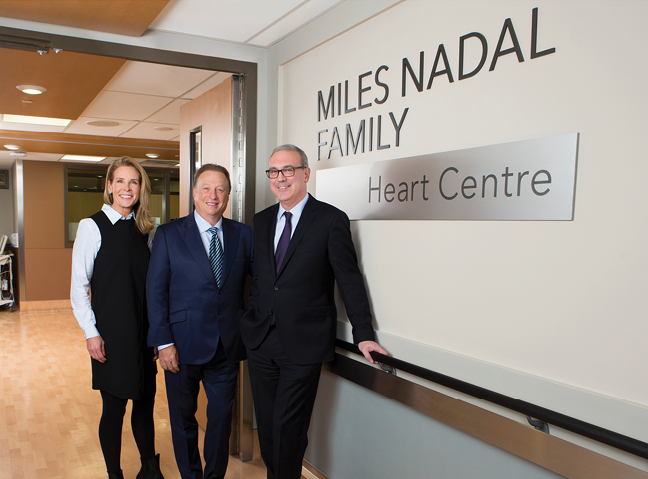
Miles Nadal Heart Centre, Mount Sinai Hospital, Toronto
In April 2018, Miles Nadal gave a landmark gift to Mount Sinai Hospital’s specialized cardiology program. The Miles Nadal Heart Centre is a destination cardiology center in the GTA with clinical and research programs dedicated to distinct patient populations, such as women with heart disease who are pregnant or wishing to become pregnant; advanced-stage heart failure patients with support devices or awaiting heart transplantation; and patients with sleep apnea and breathlessness. Additionally, the Centre houses Canada’s only research-dedicated cardiac catheterization lab. The lab has been at the international forefront of elucidating why and how heart disease has such a different pathophysiology in women than in men and how historic treatment protocols need to be adapted to female patients.
Will you discuss Peerage Capital’s philanthropic programs focused on community?
I have made a keystone gift to the Jewish Community Centre in Toronto to update and expand the facility as an inclusive community hub for an urban area of exceptional diversity. It is now named the Miles Nadal Jewish Community Centre and has two Peerage representatives on the Foundation Board.
Internationally, I’m a contributor to the effort to revitalize the Ayalon Canada Park, one of Israel’s largest parks and a popular recreation site for families and an education center that focuses on ecology and Jewish history. There is also a donation to Yad Vashem, Israel’s official memorial to the victims of the Holocaust, to construct the Miles S. Nadal and Family Wall.
You commit a great deal of time and resources to supporting initiatives relating to healthcare. What has made healthcare a major focus for your philanthropic work and will you discuss your efforts in this area?
I’ve been involved for three decades as a director, fundraiser and donor for Mount Sinai Hospital in Toronto which culminated in a major donation to create the Miles Nadal Family Heart Centre (MNHC) in 2015. The MNHC is widely recognized as a center of excellence for pre- and post-natal maternal cardiac care, as well as leading-edge research. This is a place where child welfare and education are integrated into the cause.
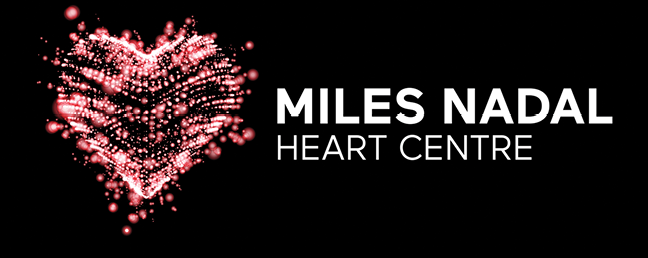
A long-time supporter of the hospital’s emergency care department, I was the founder of Leadership Sinai, a group of young business leaders who have raised more than $20 million to advance care and research. That continues in the hands of Peerage representatives on the Board where they are involved in a number of fundraising initiatives.
On the international front, I donated a fleet of “ambucycles” to United Hatzalah which allows for more rapid emergency response in Jerusalem. In the past, I was recognized at the Damon Runyon Annual Breakfast in honor for support of the innovative cancer research center in New York City, which raised $1.3 million for cancer research.
Another area of focus for your philanthropic work is child welfare. How are you addressing this issue and will you provide an overview of the Miles and Kelly Nadal Boys and Girls Club in Toronto’s Regent Park?
I grew up in a family of modest means, but my parents were very involved, very present, and very supportive. That’s not always the case these days and, as we all know, kids face all kinds of new challenges and issues.
That’s why the Miles and Kelly Nadal Boys and Girls Club is especially dear to my heart. It’s a safe place where kids can go to participate in programs focused on sports, academic mentoring, life skills and social skills. They are exposed to positive role models. They are supported in pursing education and articulating their dreams. They also get fed healthy snacks and sometimes more, as needed.
Again, Peerage remains actively involved with the Foundation Board and with ongoing support for emerging programs including one that uses sports as a springboard for mental health solutions.
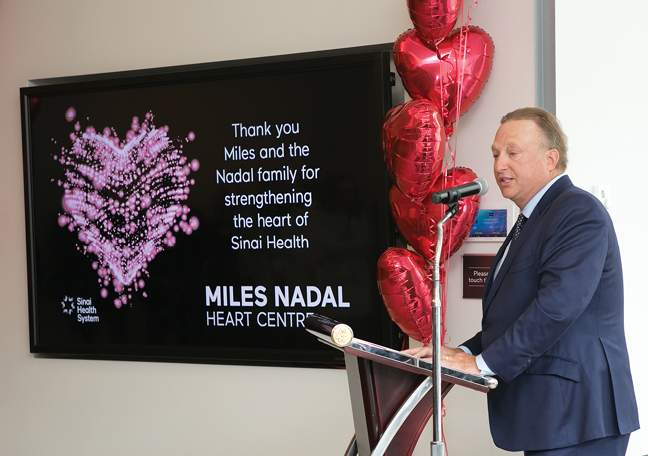
Miles S. Nadal delivers a speech at the opening celebration
of the Miles Nadal Heart Centre
at Mount Sinai Hospital in Toronto, February 2018.
You created the Miles S. Nadal Management Centre for York University’s Schulich School of Business. Will you discuss your efforts around education and your focus on helping to foster the next generation of Canadian business leaders?
I’m passionate about encouraging entrepreneurs and sharing the lessons that I, and many of my generation, learned the hard way.
That commitment to supporting the next generation of Canadian business leaders led to a substantial donation to establish the Miles S. Nadal Management Centre for York University’s Schulich School of Business. It provides world-class facilities for executive business students off campus in the financial district.
The same focus on education and the fast-paced digital media sector led to the creation of The Koenigsberg and Nadal Interactive Media Centre at the University of Miami.
Internationally, I provided funding for a molecular genetics research laboratory at The Weizmann Institute of Science in Israel. After serving as a member of the Board of Governors at Tel Aviv University, I was inspired to make a donation that founded the Miles S. Nadal Institute for Technological Entrepreneurship at Tel Aviv University.
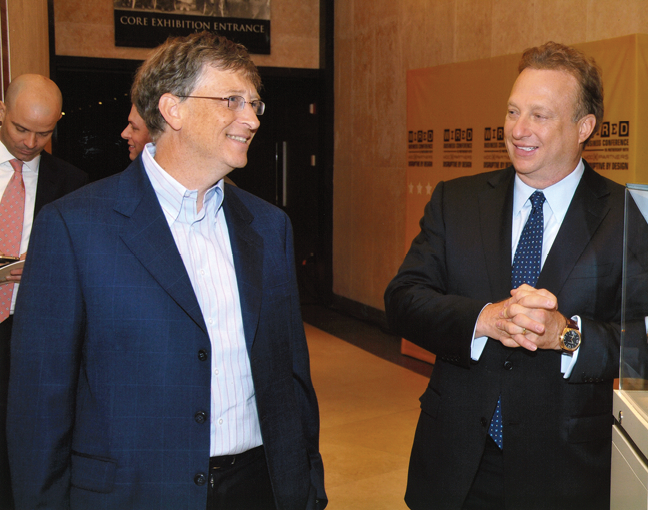
Miles Nadal with philanthropist Bill Gates.
What have been the keys to building strong employee engagement for Peerage Capital’s philanthropic work?
It all starts at the beginning with the people that we hire at Peerage. From the outset, we are looking for people who share our core values as an organization. That makes it a very organic, natural process.
The next step is to connect them with people and causes that resonate with them. We help them explore their philanthropic interests and because Peerage is involved in so many areas as a company, there’s always something that sparks their desire for engagement.
It’s critical that this priority is clearly flagged and respected by the most senior ranks of the company. Executives and managers understand that they have to allow some leeway for the philanthropic work our employees care about. It may not always be convenient to have someone out on a Meals on Wheels run or at a foundation or board meeting, but those obligations must stand.
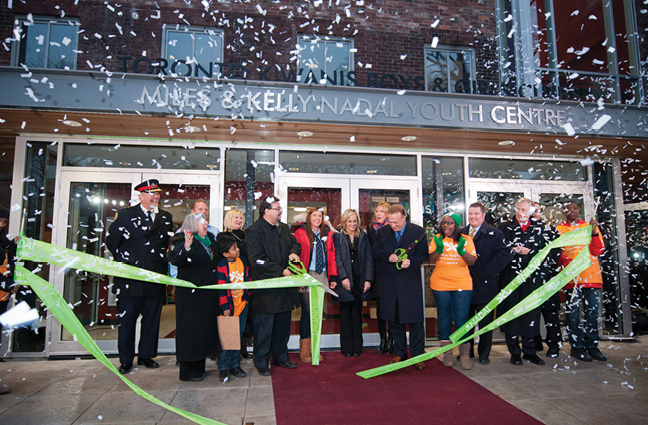
The Miles & Kelly Nadal Youth Centre, Toronto
In April 2011, the Miles and Kelly Nadal Youth Centre was established to provide a dedicated after-school facility for at-risk children in Regent Park and Downtown East, Toronto. Miles’ ongoing commitment to this club at the heart of a vulnerable community enables it to continue to operate the creative and innovative programs that address and meet the changing needs of the community it serves.
Is it critical to be a purpose-driven company today in order to attract and retain top talent?
To my mind, the very definition of “top talent” includes the willingness to give back and to engage in social causes and enterprises. I think the culture that is rooted in such values builds an internal spirit that creates long-term teams with a strong bond. This is proved by the great number of people at Peerage who have worked with me for decades and they are a very tight group.
Do the skills required to be successful in business translate to being effective in philanthropy?
To be really successful in business, you need to have emotional intelligence and social imagination. You need to be able to listen and to look beyond your own agenda. You need to connect with people, to walk a mile in their shoes, to respect where they are coming from. This is especially true in client-centric businesses, which has always been my area of focus.
Those are the same principles that make you an effective philanthropist. That, and counting your blessings every single day.
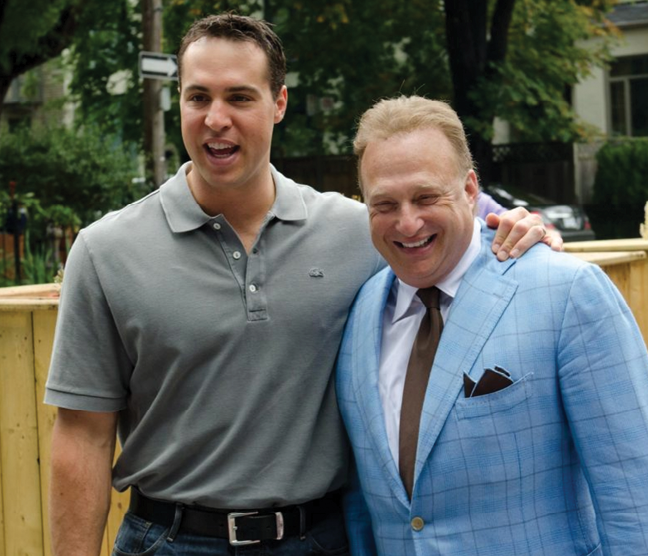
Former Major League Baseball player Mark Teixeira and
Miles Nadal
at
the Miles & Kelly Nadal Youth Centre
, a chapter of the
Toronto Kiwanis Boys and Girls Club.
How critical are metrics in order to track the impact of your philanthropic investments?
Metrics are important for any undertaking: what gets measured, gets done. That’s especially true in the philanthropic area because success generates success. If others see the progress that’s being made, the difference that your support is making, they are far more likely to join in and add their dollars and support.
That said, metrics aren’t everything. Approaching a cause with an open mind and an open heart is also important to its success.
When you are addressing long-term issues that require long-term solutions, do you need to look at success incrementally and is it hard to be patient in this effort?
Actually, you have to have a different measuring stick like you do with your children. You need to be patient when you are feeding and supporting worthy causes. You can’t hold them to the same standards as a business enterprise. They have a fraction of the financial resources, a fraction of the human resources and they have an overwhelming plethora of needs. You need to try to get involved with organizations that want to adapt the level of sophistication that you’re bringing and who recognize the value of the contribution of human talent and financial resources that you bring. You want to help keep them on the road to perpetual self-optimization and self-improvement.
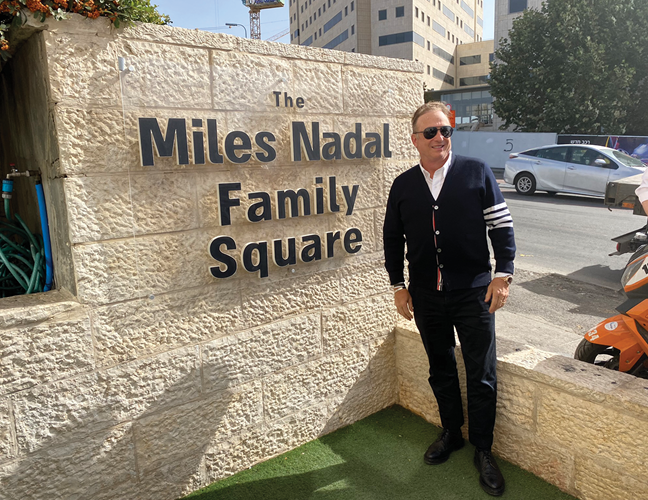
Miles Nadal at the dedication of the Miles Nadal Family Square outside of the United Hatzalah. Recognizing a need to expedite emergency services to those in need, United Hatzalah established the “Ambucycle Unit”. The use of Ambucycles for first response has proven to be a critical link in the emergency chain of survival, allowing rescue personnel immediate access to the scene or home of a patient. The success of Ambucycle is proven in the numbers, with response time averaging 90 seconds as drivers can avoid traffic, road closures and parking limitations. An Ambucycle receives 40 calls a month and on average saves 120 lives a year. Miles Nadal donated 10 Ambucycles to the growing United Hatzalah fleet, saving on average of 1,120 lives a year.
Some of the issues are sort of basic. With feeding hungry children, for instance, if we’re feeding more children every year, we feel a sense of accomplishment. If there are more women with high-risk pregnancies being dealt with at the cardiac center and we are saving lives and enabling women to safely give birth, we feel a great sense of accomplishment. If we are sending more kids to summer camp, if we’re delivering more Meals on Wheels, if we are giving more presents to kids at Christmas who are going hungry and we’re providing food and gifts for them, we feel great satisfaction. Some of the most enjoyable activities are helping individuals in need and not just organizations. This sometimes involves one-off kinds of initiatives and we’re doing more of those because the satisfaction is extraordinary.
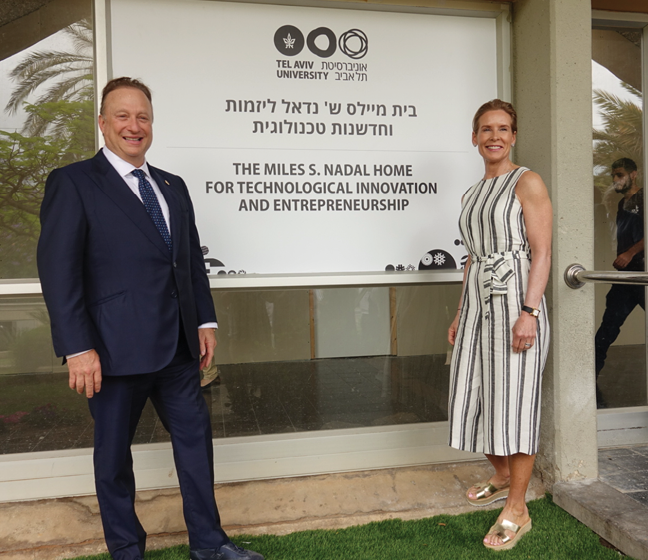
Miles and Kelly Nadal at the dedication of the Miles S. Nadal Home For Technological Innovation and Entrepreneurship. This institute celebrates innovation amongst the students at Tel Aviv University by encouraging and facilitating student innovators as they take their inventions from the university lab to the marketplace. In 2012, determined to help ensure that more lab breakthroughs make their way into the real world and improve quality of life, The Miles S. Nadal Institute for Technological Entrepreneurship at Tel Aviv University was established.
The direct gratification from helping people on a one-on-one basis is remarkable and I give credit to Deirdre McMurdy and to Trevor Maunder and to Lisa Conrad and some of the other people in the Peerage family at what I call the support center who have really been driving this down to the grass-roots level. Writing a check for those who have the means is not that complicated. Rolling up our sleeves, getting involved, donating the human capital requires a sacrifice that our people make from their day-to-day lives where they already have huge responsibilities. While it puts more responsibility on their plates, they seem to fill that void and still deliver excellence in their jobs. This is because of the emotional reward and gratification that they are, in some modest way, making the world a better place.
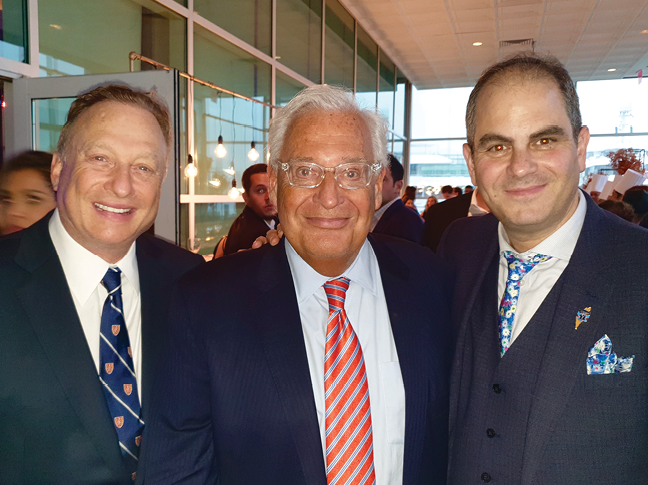
Miles Nadal, U.S. Ambassador to Israel, David Friedman,
and the Founder of United Hatzalah, Eli Beer.
Do you take moments to appreciate the impact that has been made with your philanthropy and your leadership in this regard?
To be truthful, I get far more from supporting good causes and good people than I could ever give. I’m proud of what Peerage and our team have done and will do. I am so deeply grateful that I am at a place in life where I am able to give back.
I think leadership is based upon setting an example. One of the differentiating characteristics that I’ve always felt about my own leadership is showing that doing good ends up enabling organizations to do well. I also learned very early in my life that it’s a privilege to give back. In fact, it almost feels like a selfish act because giving is so rewarding, both emotionally and functionally. The credibility that we as an organization have experienced increases because we are more generous and we punch above our weight in the area of generosity. We’re always giving way more time, way more talent, and way more treasure than most organizations of our size and that’s always been a philosophy of ours. It has worked out well for the organization.
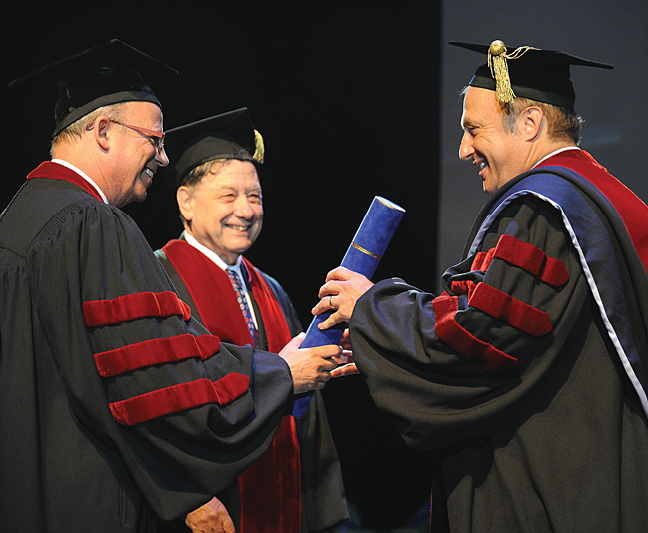
Miles Nadal receives an Honorary Doctorate from Tel Aviv University.
I’ve always believed the adage, “A hundred years from now it will not matter what my bank account was, the sort of house I lived in, or the kind of car I drove, but the world may be different because I was important in the life of a child.”
For every one of our corporate partners at the parent company and for every one of our partners in the network of our businesses, there’s no question that one of the most attractive features about being part of the Peerage Capital family is the commitment that we have to make the world a better place and the role and responsibility and involvement that all of our employees and partners feel to make that happen.
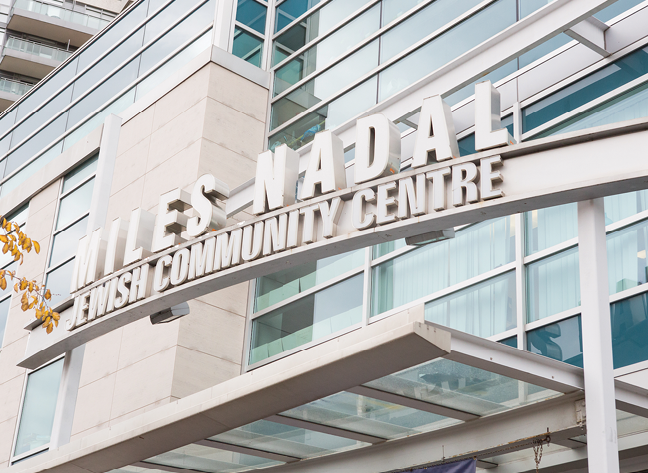
In 2004, Miles Nadal provided a keystone gift of $2.5 million that enabled the building of a brand new centre for the community at Toronto’s Bloor Street Jewish Community Centre. Thanks to his support, it now boasts a 3,800 member state-of-the-art fitness centre, a 285-seat theatre, four schools, three choirs, and a wide range of arts and cultural activities, along with Jewish life programming, and a robust Active 55+ program. This substantial donation to the community earned Miles Nadal the Outstanding Volunteer Fundraiser Award from the Association of Fundraising Professionals Greater Toronto Chapter.
As our business has prospered, we have stepped up and made sure that our commitment of time, talent, and treasure to charity has kept pace or exceeded that. I think that has really been a great asset to our success and one that everyone is very proud of. This has been a philosophical differentiator for us that we have had for at least 30 odd years and we have put in place a mechanism by which it will go on for the next 30 years. When I am no longer involved, the commitment that my family has to our businesses and to our partnership and to the Peerage family is such that we will continue to donate for hopefully a couple more generations and then some.![]()
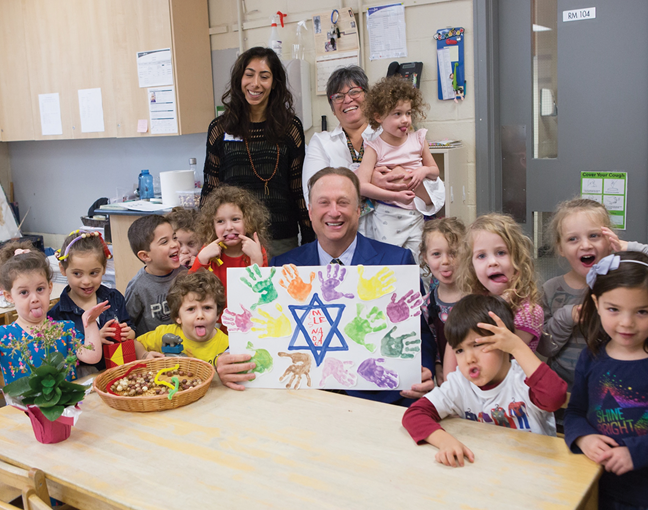
On November 8, 2018 the Miles Nadal Jewish Community Centre hosted Peerage Capital Founder and philanthropist Miles S. Nadal for a candid Q&A with the MNJCC staff. Miles was thrilled to be able to visit a place that is so meaningful to him and that has been a central focus of his philanthropic efforts.